Still Walking the Streets of Brisk
| March 15, 2022A year after his passing, Rav Dovid Soloveitchik's memories live in print
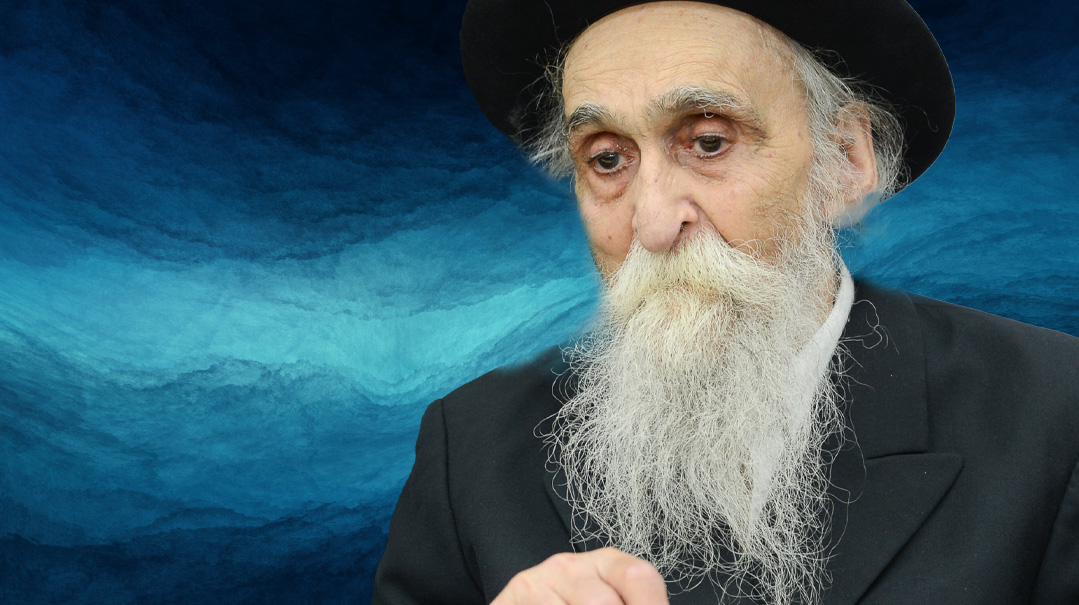
Photos: Mishpacha archives
Although Rav Meshulem Dovid Halevi Soloveitchik ztz”l lived on Amos Street in Jerusalem’s Geula neighborhood, his mind remained in a faraway Eastern European town. Reb Dovid, the Torah world’s senior rosh yeshivah who passed away on 18 Shevat last year at the age of 99, was the link between the past and the future: He lived in the alleyways of Jerusalem, but his spirit was still on Listovksa Street in Brisk.
During one of his shiurim, Reb Dovid related to his talmidim a certain chiddush from his father, the Brisker Rav, and then he sighed. “I remember that when my father gave this over at the time, we literally danced with joy,” he said. “But now, when I say that same shtickel, I see toite peinimer (dead faces).”
He went on to explain: “If you have an undecipherable sugya because everything is dark before your eyes, then when it becomes clear and the questions are answered, you see a great light, and then of course you dance. But today, when you ask a question, you don’t even feel the darkness, and therefore, after the answer, it doesn’t become lichtig. So what is there to dance about?”
“I don’t have complaints to the ‘oilem’ in our time, because I come from another world,” Reb Dovid told a talmid on another occasion.
Yet generations of talmidim attest to the fact that Rav Meshulam Dovid Soloveitchik’s presence was a joyous place to be, and bochurim who flocked to him retained their close connection even years after they married and had families of their own, often living across the world. Because in the precision and punctiliousness of Brisk, the zeal for dinim and the near-tangible fear of Heaven, Reb Dovid revealed the pulsating core of life running through halachah. This was the way in the joyous house of his father, the Brisker Rav, as well — the joy of toil, the joy of accomplishment, and the joy of living the truth.
For Reb Dovid, the memories of Brisk, which he’d left when fleeing the Germans, weren’t simple nostalgia, but rather a blueprint for a Torah environment, and there was something to learn from every single detail, says Rav Shimon Yosef Meller, the acclaimed biographer of the Brisker dynasty.
Reb Dovid’s memories of the town of Brisk remained crystal clear even in his old age. Rav Meller recounts how he once traveled to Belarus in an effort to save part of the Jewish cemetery from demolition. Before his trip, he met with Reb Dovid Soloveitchik to ask if the Rosh Yeshivah remembered anything about the grave of the Beis Halevi, his great grandfather. To Rav Meller’s surprise, Reb Dovid dictated a series of flawless, detailed directions to the grave — nearly eight decades after his departure from Brisk.
Reb Dovid was suffused with the reverence for his forebears and considered every one of their words a treasure, every anecdote priceless. When Rav Meller was preparing his multivolume biography of Rav Chaim Soloveitchik, he discovered that he had a plethora of stories about Rav Chaim’s acts of chesed alone, and was concerned that those stories would detract from the image of Rav Chaim as a master Torah scholar. Reb Dovid Solovetichik, however, had a different view of his venerated grandfather. “Every story that isn’t published is a shame,” he told Rav Meller.
Rav Meller learned in Brisk as a bochur and remained a close talmid of Reb Dovid until his final day. For 36 years he closely accompanied Reb Dovid, helping him with whatever needed to be done and taking him where he needed to go.
And over all those years of closeness and conversation, Reb Dovid shared with him crystal-clear memories of his childhood in Brisk and details of the family’s subsequent rescue during the Holocaust and arrival in Eretz Yisrael, which few today remember. Rav Meller, author of The Brisker Rav: The Life and Times of Maran Hagaon HaRav Yitzchok Ze’ev Halevi Soloveitchik and several books in Hebrew about the Brisker dynasty, kept a diary of these precious accounts. And they form the basis of his newest release, Acharon Ledor Deah (coming out this week in the US), about the life of Reb Dovid.
“Throughout his life, the memories of Brisk and the venerable personalities he knew before the war were always fresh in the Rosh Yeshivah’s mind,” Rav Meller says. “Yet when he was asked if he wanted to join a trip back to Brisk, he said that emotionally, it would be too difficult — he was afraid his heart wouldn’t withstand it.
“Still, nearly 80 years after his departure, the Rosh Yeshivah remembered every one of its streets. Sometimes he’d even sketch maps for travelers, marking the places where there was once a shul or beis medrash.”
Rav Meller would sometimes present Reb Dovid with photos of yeshivah bochurim of Brisk, and ask the Rosh Yeshivah to identify them. Reb Dovid would often be taken aback that those photos still existed and that Rav Meller was able to access them. “How are you able to get such photos?” he’d ask in amazement, and then, gazing at the black and white images, his face would cloud with sadness. He’d name many of those faces and then sigh, “Ach… these were menschen…”
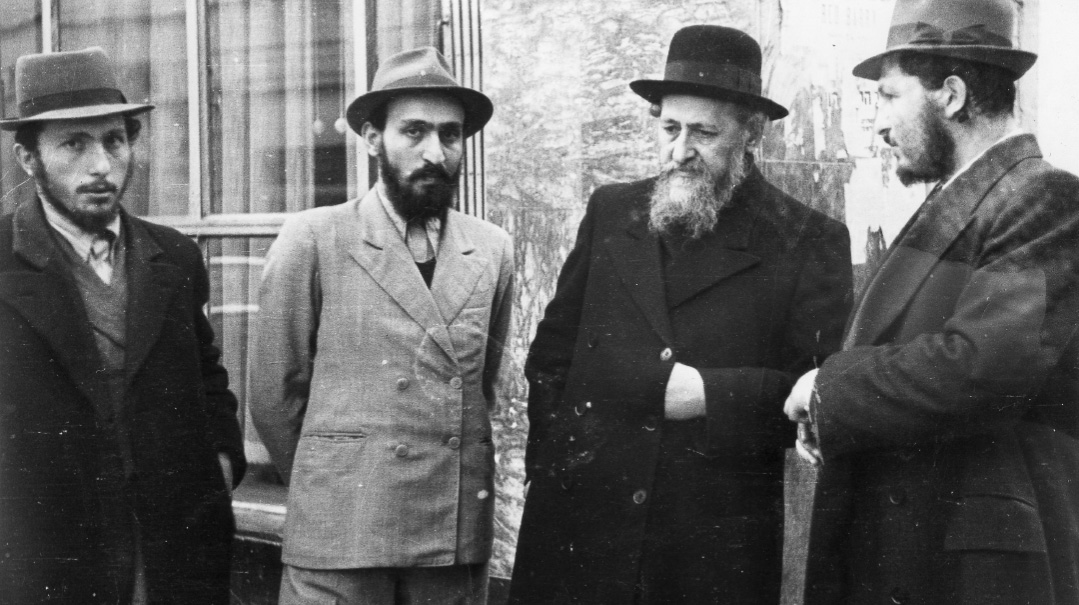
Uncompromising chinuch with love. The Brisker Rav with Reb Dovid, who began to give chaburos after his father’s petirah in 1959, eventually winding up with his own yeshivah; with sons Meir and Meshulam Dovid as new immigrants after the war, and later with Rav Dovid and Rav Yosef Dov
Walking Together
“We tend to think of Brisk as harsh and judging,” Rav Meller relates, “but the Rosh Yeshivah would often speak of chinuch fundamentals that he absorbed in his father’s house from a very young age.” The Rosh Yeshivah would share how his father, the Brisker Rav — Rav Yitzchak Ze’ev Soloveitchik — understood that even the soul of a very young child is sensitive enough to notice what is important and dignified in the eyes of his father and mother and what is trivial.
“The way of the world is that when a child breaks a dish, the parent gets angry and rebukes him, especially if it’s a valuable or expensive piece. But as children, we were never scolded for things like that,” the Rosh Yeshivah, one of 12 children, told Rav Meller. “My father’s path in chinuch was different.”
Contrary to what people might assume, “We had a very leibedik house, we were quite rambunctious, and naturally things broke often,” Reb Dovid said. “But my father never got angry about this, and he never raised a hand to strike us over anything related to gashmiyus, not when we made a very big ruckus, and not even when we caused damage to the house. He always ignored it and continued with his affairs as though nothing had happened.
“Even when the children were playing while he was giving his daily shiur, he wouldn’t say a word. He pretended not to notice. Children, he felt, were supposed to play, and even to get a bit wild, so why punish him for that? The natural rambunctiousness of children is healthy for them.”
But the Rosh Yeshivah stressed how radically different it was if the Brisker Rav saw one of his children doing an aveirah or something not in the spirit of Yiddishkeit. “Then he would scold us, in order to be mechanech us,” the Rosh Yeshivah told Rav Meller. “Even if it looked like a minor matter, something that would pass with age, he felt that desires and wishes, even at this age, had to be appropriate for the path of Torah.
“If it was about bittul zeman, or touching electricity on Shabbos, he would be extremely sharp, and he imbued deeply in us children how serious bittul zeman is. He also instilled in us a deep fear of doing something that contravenes ratzon Hashem.”
His uncompromising chinuch notwithstanding, Rav Yitzchak Zev cared for his children with utmost love and dedication. A girl who came to teach in the local Bais Yaakov the Brisker Rav had established related that each evening, when the children went to bed, the rav would pass by each of their beds and speak to each child. “What did you eat today? How much? What did you learn?” He would ask each child about their day, then recite Krias Shema with them, and straighten their blankets.
Reb Dovid, who was born in 1921, was still a young bochur when the onset of World War II turned his own world upside-down. Two weeks later, the Germans occupied Brisk, and the Soloveitchik family fled. In the aftermath of the German invasion, the family was torn apart. The Brisker Rav managed to escape to Vilna along with four of his sons: Rav Yosef Dov, Rav Chaim, Rav Raphael, and Rav Meshulam Dovid. Several months later, three more children managed to evade the Nazis’ clutches and join them: Rav Meir Soloveitchik and his two sisters, the future Rebbetzins Lifsha Feinstein and Rivka Schiff. Tragically, Rebbetzin Alte Hindel and her three remaining children (two other children had passed away years earlier) remained trapped in Brisk and were murdered by the Nazis. The Brisker Rav and his surviving children ultimately made their way to Eretz Yisrael, where he became one of the foremost spiritual leaders of the generation and established his own yeshivah.
After the petirah of the Brisker Rav in 1959, Reb Dovid started to say chaburos to bochurim, but not within a formal yeshivah. The Brisker Rav’s eldest son, Rav Yosef Dov (Berel) Soloveitchik, took over the leadership of the Brisk yeshivah in Geula after his father’s passing, and later, Rav Meshulam Dovid and Rav Meir Soloveitchik went on to open prestigious yeshivos of their own. (After Rav Berel’s passing, his own eldest son, Rav Avraham Yehoshua, took the helm of the original yeshivah of Brisk.) Later in life, when Reb Dovid had thousands of talmidim and was delivering several weekly shiurim on various parts of Shas, he would speak of those pre-yeshivah years — the 1960s and 70s — with a certain wistfulness: Back then, he’d say, he was free to sit and learn.
Once they arrived in Jerusalem, the Brisker Rav became father and mother to his newly-orphaned family. Rav Meller shares how, as per the instructions of the Brisker Rav’s physician, he would walk each day along David Yellin Street, always accompanied by a child or talmid. Sometimes he’d be joined by his young daughter, the future Rebbetzin Rikva Schiff.
The Rav realized that his daughter felt uncomfortable about their walks together and told her: “When we lived in Brisk, we sometimes traveled to the resort towns of Otwock and Krinitiza, along with many rabbanim and rebbes. But while the rebbes usually came with meshamshim, and their families remained at home, the gaavad of Lutzk, Rav Zalman Sorotzkin ztz”l, would come with his family and make sure to take walks with his daughter.
“When his daughter wondered about this, Rav Zalman told her: ‘My daughter, those who left their daughters at home — I don’t know what their spiritual outcome will be. But you are here with me, and therefore, I can be sure that you’re in a good environment. You can feel comfortable that you’re walking with me. You don’t have to be embarrassed…”
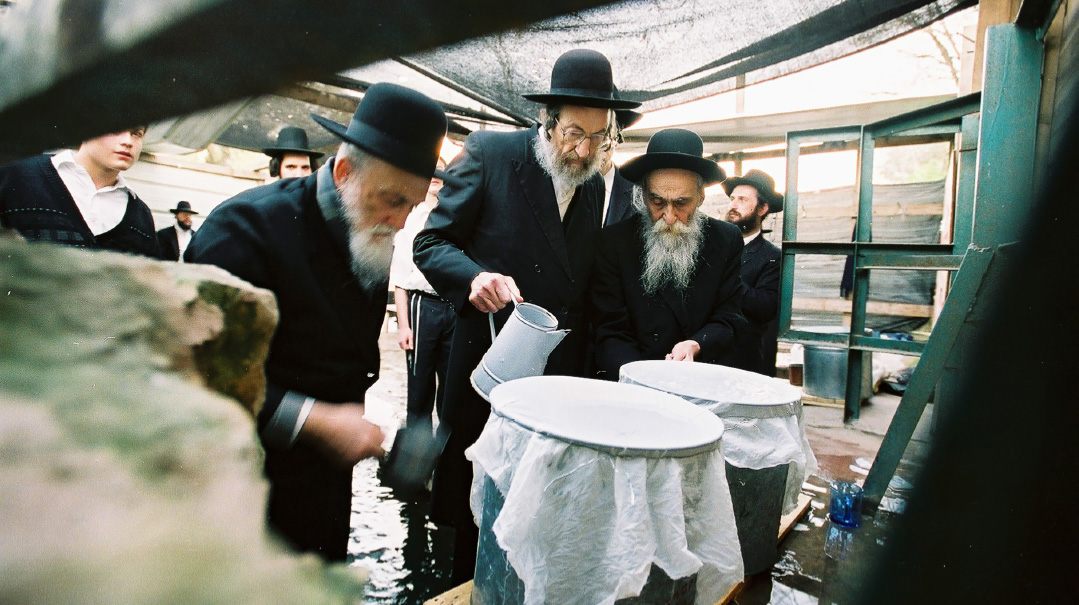
When drawing mayim shelanu, Reb Dovid’s fear was intense, but once the mitzvah was fulfilled, his joy was boundless
Keep it Simple
Reb Dovid was at his father’s side day and night, and the Brisker Rav, recognizing his son’s abilities, guided him in detail about what and how to learn.
“As a bochur, Reb Dovid would learn masechtos in Shas during first seder,” Rav Meller relates. “Toward the end of the seder, he would write down his father’s shiurim from the day before, plus his chiddushim on them. In this limited amount of time, he managed to write thousands of chiddushim in his elegant, organized handwriting. For the second seder, he would learn the masechta that the Rav had said his shiur on.
“The Brisker Rav would ask to hear what Reb Dovid was mechadesh. Sometimes he agreed, and would praise the ideas and even expound on them further. Sometimes, he said that Reb Dovid had thought just the way he had when learning the sugya. But when he felt it was the right thing to do, he would dispute his son’s words. He would often tell his son, ‘I don’t want you to say yes and agree with me. Whatever doesn’t look right to you, say so, and don’t be like a chassid who accepts his rebbe’s words without any questions!’”
For his part, says Rav Meller, Reb Dovid conveyed this path to his talmidim as well. “He would say that first and foremost one has to learn a lot of Gemara with Rashi and Tosafos, and to know what was written. Even if one doesn’t reach a full understanding, at least he should know what it says. That’s the basis for acquiring the ‘sechel haTorah,’ and to later reach greatness in Torah and a deeper understanding.
“He related how in Brisk, bochurim entered the yeshivah gedolah at about age 14. For the first three years, they didn’t hear “Toirahs” at all, except for a question of Rabi Akiva Eiger, or a shtickel from the Avnei Miluim or the Ketzos Hachoshen here and there, and from time to time a small vort from Rav Chaim ztz”l. Most in those years covered a lot of ground with just Gemara, Rashi and Tosafos — covering about sixty daf in one zeman, which they’d review five or six times, until it was impossible to catch a serious bochur not knowing a Tosafos on the dapim they’d covered.”
Reb Dovid firmly believed that this methodology was the path to greatness in Torah. “Only when the bochurim turned 20,” Reb Dovid explained, “did they start learning more in depth and begin hearing “Toirahs” and shiurim. That’s how the yeshivah bochurim grew into talmidei chachamim and gedolim in Torah. In Volozhin as well, they learned one masechta after another, from the beginning of Shas to the end, and we saw for ourselves all the giants that emerged from there.
“Only when one knows the sugya in the text and in-depth can he begin to look at the words of the Acharonim,” Reb Dovid would say. “For the most part, the pilpulim and the arguments and delving further in — not only don’t they bring the one doing it to become a talmid chacham, but the opposite.”
Reb Dovid would share a story. “Once, a group of bochurim came during the zeman to speak in learning with my father. Der Tatte asked them what they’re learning, and they answered, ‘Maseches Gittin.’ He asked them where they were holding and they said ‘daf chof.’ Der Tatte said, ‘In middle of the zeman, and you only did 20 blatt? You’re not learning Gittin, you’re learning zich — you’re immersed not in the masechta but in yourselves, your own comforts.’”
With regard to authentic chiddushei Torah, Rav Meller explains, Reb Dovid would always stress that the chiddush should be as simple as possible, and the way to evaluate a good chiddush is if as a result, the mechadesh understands the words of the Gemara in a simpler way.
“Reb Dovid held that a person should always continue to learn more and more masechtos,” Rav Meller notes. “Daf after daf, he can accrue knowledge in the expanses of Torah. Because Rav Dovid held that without bekius it’s impossible to understand Torah properly.”
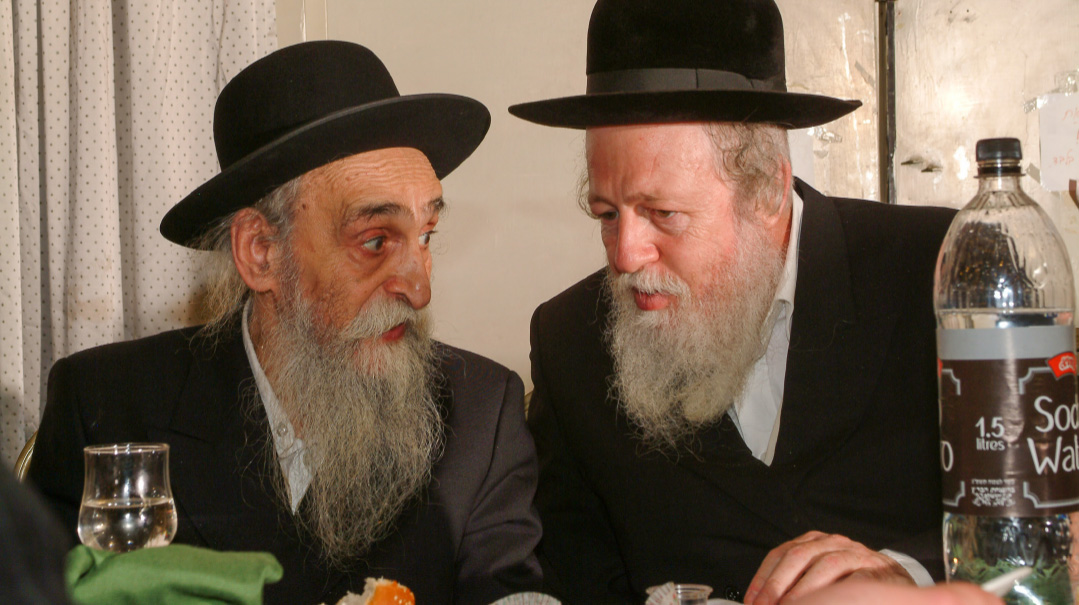
With nephew Rosh Yeshivah Rav Avrohom Yehoshua
Fear and Joy
Like his father, Reb Dovid’s yiras Shamayim was legendary. Once someone asked him why he made such a big deal about the mitzvos and was constantly tense about fulfilling them. “For me, the mitzvos, and the fear of not doing them, is like sleeping on the edge of the roof of the Twin Towers,” he responded.
“When I was young,” Rav Meller says, “I once said to a veteran talmid that I didn’t think Reb Dovid deserves a reward for his mitzvos, because his fear of Gehinnom is so tangible that it’s very simple and clear to him that he can’t deviate right or left from the Will of Hashem. But the person replied that I was mistaken: The fear was not of Gehinnom, but of the sin itself. It was the reality for him — a sin for him was like invasive bacteria. When he saw someone sinning, he saw someone walking around with a sword or a bomb in his hand.”
Rabbi Meller says a person who didn’t witness it can’t really understand it. “Reb Dovid lived in fear of HaKadosh Baruch Hu. You could see his awe every single moment. He lived a life of Olam Haba in this world, standing in fear of the King of kings. It wasn’t only fear of sin. It was the tangible faith that sin causes inestimable damage.”
But it wasn’t all about fear. Reb Dovid imbibed from his father the firm belief that true joy comes only from Torah learning and mitzvos. “On the one hand, before doing a mitzvah, like when he went to bake matzos, or draw mayim shelanu, his fear that everything should go according to halachah was intense,” Rav Meller explains. “On the other hand, after engaging in the mitzvah, and meriting to see it fulfilled, his joy was boundless. It was a deep, inner joy that cannot be described. When he was presented with a beautiful, mehudar esrog, it was as if he’d received a gift worth millions of dollars.”
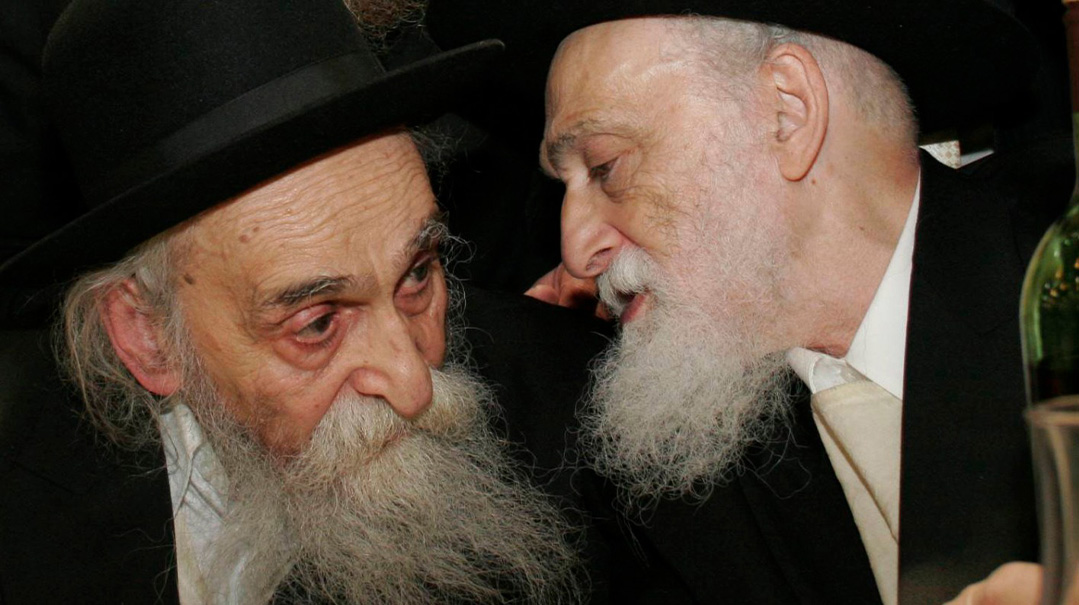
A personal moment with his brother Rav Meir ztz”l. With their thousands of talmidim, Brisk lives on
The Wrong Train
Rebbetzin Yehudis (nee Sternbuch) grew up in a wealthy home in England and was accustomed to upscale conveniences, but when she married Reb Dovid and realized that in her father-in-law’s home, even conveniences were viewed as luxuries, she unquestioningly adapted to her husband’s ways.
“This world is filled with nisyonos, and there is only one solution,” he would tell his talmidim, “only ameilus b’Torah. Only real yegiah can close off your mind to the temptations of Olam Hazeh.”
Still, Reb Dovid was sympathetic to the physical needs of others. Once a guest asked him why the tefillos that the Kohein Gadol recited after he left the Kodesh Hakodoshim on Yom Kippur are about gashmiyus and not about ruchniyus. Reb Dovid answered that a person needs to know that he should daven for the other person’s gashmiyus. “Don’t worry about the other person’s spirituality, only his material well-being,” he said. “Worry about your own ruchniyus.”
Yet Reb Dovid was also very firm about the necessity for frum Yidden to separate themselves from the wider world, while still remaining cognizant of their influence on all of Klal Yisrael. He would repeat what his father had taught him:
“A train with many carriages, carrying masses of passengers, traveled through a muddy swamp. Suddenly the train derailed and began to sink into the mud. All the passengers were gripped in fear at their impending end, but one of the passengers stood up and began crowing with joy. He stood on one of the benches and announced: ‘Even if all of the passengers will sink to their deaths, I’m higher than their heads, and I’ll be saved!’ ‘Fool!’ the other passengers told him. ‘Sooner or later the entire train will sink into the swamp until it disappears. Even if it’s possible that you’ll live a minute or two longer, what value does that have if you’ll also die? If you want to save your life, try to jump off the train before it sinks!’
“Der Tatte continued, ‘Unfortunately, the train of the masses from the Jewish nation has long been derailed. They’ve deviated from the straight path. We, the people of Torah, must find every way to ensure our fate is different. If we think that it’s enough for us to elevate ourselves a bit over the heads of the rest, we’re mistaken. Sooner or later, we will find ourselves sinking up to our necks in the swamp. We need to jump that train and head for a new train that will safely take us on the right path.’
“He saw the tzibbur of bnei Torah as having deep spiritual influence on all of Klal Yisrael, an influence that also came with tremendous responsibility,” Rav Meller says. “He once told me in the name of his father that on Yom Kippur, even those who are far from Torah observance improve, and it comes from the chizuk that exists among those who are chareidim l’dvar Hashem, because those who consciously move higher on Yom Kippur indirectly cause even those who are far to come closer on this day.”
Reb Dovid keenly felt a responsibility to other Jews.
“Once,” Rav Meller relates, “Someone asked Reb Dovid, who was a Levi, why he said the Haggadah on Seder night, as the Leviim weren’t part of the bondage of Mitzrayim and didn’t suffer from the hard work.
“Reb Dovid responded to the questioner, ‘And if someone has a bruise on his right hand, the left hand doesn’t suffer? The whole body suffers from the blow. And when Klal Yisrael suffered bitterly from Pharaoh and Egypt, do you think that Shevet Levi didn’t suffer from the fact that all of Am Yisrael suffered? When there was a fire in Brisk and half the city went up in flames, my grandfather Rav Chaim didn’t rest for a moment until he made sure everyone had a place to sleep. He refused to go to sleep until he knew for certain that all the residents of Brisk had a place to sleep. That’s what it means to be a brother — to worry for each individual person.’ ”
Reb Dovid once shared the following thought with Rav Meller: “Yosef Hatzaddik gave his older son the name Menashe and said, ‘Ki neshani Elokim es kol amali v’es kol bais avi.’ Where do we find that a person is happy or gives his son a name in commemorating that he ‘merited’ to forget his father’s house? What is good about forgetting one’s father’s house?
“But,” Reb Dovid explained, “Yosef knew that if he would always live with the past, and would constantly remember his father’s home, in all its greatness and glory, he wouldn’t be able to move ahead and rebuild himself. That’s also the meaning of the pasuk in Koheles, ‘Al tomar, do not say, why was it that the first days were better than these, because it is not from wisdom that you ask this.’ It isn’t wise for a person to always have the past in his mind, because only through a certain measure of forgetfulness will he be able to advance and to take action.”
Perhaps Reb Dovid, a link between generations, who taught and inspired thousands from his modest home in Geula but in a sense never really left his father’s home in Brisk, was also saying it to himself.
(Originally featured in Mishpacha, Issue 903)
Oops! We could not locate your form.






